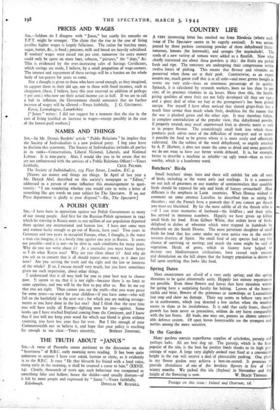COUNTRY LIFE
A VERY interesting letter has reached me from Rhodesia (where each issue of The Spectator seems to be eagerly awaited). It was accom- panied by three packets containing powder of three dehydrated fruits: tomatoes, lemons (for lemonade), and oranges (for marmalade). The seeds of a new variety of tomato were added as a flourish. Now what chiefly interested me about these powders is this: the fruits are picked fresh and ripe. The tomatoes are undergoing their compression within twelve hours of picking. This means that flavour and vitamins are preserved when these are at their peak. Contrariwise, as an expert assures me, much green stuff that is at all stale—and most greens bought in towns are very stale—loses an enormous percentage of its quality. Spinach, it is calculated by research workers, loses no less than 7o per cent. of its precious vitamins in 24 hours. More than this, the health- giving qualities of most fruit are not fully developed till they are ripe ; and a great deal of what we buy at the greengrocer's has been picked unripe. For myself I have often noticed that tinned grape-fruit has a much finer savour than much whole fruit, doubtless for the reason that the one is plucked green and the other ripe. It may therefore follow, in complete contradiction of the popular view, that dehydrated powder, if properly treated, may excel unprocessed fruit in dietetic merit as well as in proper flavour. The astonishingly small bulk into which those products pack solves most of the difficulties of transport and so makes it possible for food to be grown where it is most easily and effectively cultivated. On the subject of the word dehydrated, so angrily attacked by A. P. Herbert, it does not mean the same as dried and more generally we do not want to have our better words debased. It is, for example, better to describe a machine as reliable—an ugly word---zhan as trust- worthy, which is a handsome word.
Butchers' Birds Small butchers' shops here and there still exhibit for sale all sorts of birds, including at the worst owls and starlings. Is it a comment on our lack of gourmets or our number of sentimentalists that unedible birds should be exposed for sale and birds of luxury untouched? How different is the emphasis in Latin countries. When Horace wished to comment on some amateur Lucullus he described him as eating fat thrushes ; and the French have a proverb that if you cannot get thrush you must eat blackbird. By far the most edible of all the thrush tribe is —if I can trust memories of boyhood—the fieldfare ; and their tribe has arrived in immense numbers. Happily we have given up killing small birds for food. Even Gilbert White, that ardent lover of birds. delighted in dishes of wheatear which were trapped in hundreds by shepherds on the South Downs. The most persistent slaughter of small birds for food that has come under my own notice was in the south- western districts of Spain. No small bird of any species had any fair chance of surviving or nesting; and much the same might be said of vegetation. Herds of goats, which in history have helped to destroy two Mediterranean civilisations, have caused such erosion and denudation on the hill slopes that the hungry population is driven te fall upon anything that looks like food.
Spring Dates
Most countrymen are afraid of a very early spring; and this spring threatens to be quite abnormally early. Happily last minute repentances are possible. Even those flowers and leaves that have mistaken winter for spring have a surprising faculty for halting. Leaves of the honey- suckle and briar, flowers of the primroses or snowdrops or Laurustinus just stop and show no damage. Their sap seems to behave very much as in earthworms, which just descend a few inches when the weather seems to them to be insalubrious. It is odd that early frosts, though growth has been never so precocious, seldom do any harm comparable with the late frosts. All buds, one may see, possess an almost unassail- able defence system. Of open leaves honeysuckle are the strongest and nettles among the more sensitive.
In the Garden Many gardens contain superfluous supplies of artichokes, parsnip and perhaps leeks. All are best dug up. The parsnip, which is the least popular of the trio, is the best for poultry foods thanks to its high per- centage of sugar. A large very slightly cooked root fixed at a convenient height in the run will receive a deal of pleasurable pecking. One plant in my flower garden may achieve a best-on-record. It promises to provide abundance of one of the loveliest flowers in five of the wintry months. We picked this iris (Stylosa) in November and the Postage on this issue : Inland and Overseas, xd.


























 Previous page
Previous page